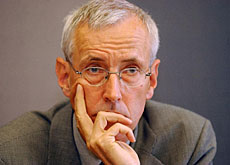
Swiss touch base with new Bush administration

Switzerland’s state secretary for economic affairs says he believes the United States is serious about completing the Doha round of global trade talks.
But after meeting government officials in Washington, Jean-Daniel Gerber told swissinfo that he didn’t expect much change in US economic policy over the next four years.
Gerber held talks with State Department officials as well as academics and representatives of various think tanks.
swissinfo: What economic policies can be expected from the Bush administration over the next four years?
Jean-Daniel Gerber: I deliberately chose to go to Washington at this time. The new administration has not taken over yet, and it’s always a very interesting time. The policies for the next four years haven’t been set in stone, so you can still hope to influence them.
Everybody I spoke to confirmed that we should not expect major changes in the Bush [administration’s] economic policies. But the president has made the completion of the World Trade Organization’s Doha round of talks a priority over the next three to four years. He hopes to push the results through Congress as a single package.
The Americans also want to sign a series of free trade agreements with selected countries.
swissinfo: Will Switzerland be among those countries?
J-D.G.: We have not discussed whether our two countries will enter a free trade agreement. It’s much too early, but we did explore possibilities of entering into such discussions.
swissinfo: Trade relations between Europe and the US have been tense over the past four years. How serious do you think Americans are about pursuing free trade agreements?
J-D.G.: If you look back in the past, the US has concluded such agreements. The tensions between the Americans and Europe have been largely exaggerated recently.
If you look at the volume of trade between the US and European countries, it was only a very small percentage of it that was affected.
It’s also normal when you have such intense trade relations that problems appear. The steel dispute was, in my view, an unfortunate affair that should not be repeated in the future. But most trade is fair and carried out according to the rules.
swissinfo: Looking at the WTO talks, what did your discussions focus on?
J-D.G: We, that is Switzerland and the US, want to get a balanced package for ourselves out of these talks. So, we need to agree especially on issues such as tariff cuts for manufactured goods, services, intellectual property rights or technical barriers to trade.
We also talked about the time frame. The Doha round should end by the summer of 2007, but there are also important talks in Hong Kong at the end of next year. So we need to devise a framework that will allow us to come up with a result. We have to devise the rules and regulations that will define the final package.
swissinfo: Your talks also focused on American homeland security measures. Some small and medium-sized Swiss companies have complained this is hindering trade with the US. Do you feel the Americans have understood these concerns?
J-D.G.: To a certain extent, yes. They have simplified the requirements for sending small parcels. You no longer have to give prior notification as a private person. But companies still have to follow these rules.
The complaints have focused on the issue that these requirements constitute a form of discrimination against non-US companies. The Americans did not indicate that anything would change in the foreseeable future. We can expect that it will take more time before the rules change.
swissinfo: You also touched on the financing of terrorism. Did the Americans say they were pleased with the way the Swiss are handling the issue given the pressure they were applying at one time?
J-D.G.: They said they were quite pleased about our collaboration. We have, for our part, no interest in having Switzerland’s financial sector used as a platform for financing terrorist activities.
swissinfo: You also talked about the war in Iraq.
J-D.G.: Switzerland has frozen a certain amount of Iraqi assets. But we complained to the Americans that, along with them and Pakistan, Switzerland is the only financial centre to have done so with funds from so-called ‘dubious persons’ from Iraq.
We are wondering what other countries are doing in that respect. There must be other financial centres where dubious Iraqi money can be found. We don’t want to be the only ones applying the United Nations’ resolutions on this issue.
The Americans are happy with our actions, but we have told them it would be useful if there were a proper appeals’ process for seized assets outside of Switzerland, since, in our view, it’s a human right to challenge an administrative decision in an independent tribunal.
swissinfo: Given the different opinions on the war in Iraq in Switzerland and the US, did you feel any animosity?
J-D.G.: No, not at all. We did not speak about the reasons behind the Iraq war. We only talked about the economic impact of the war but not about the political situation in Iraq or whether the war was right or wrong.
swissinfo-interview: Scott Capper
Jean-Daniel Gerber has been the state secretary for economic affairs since April.
Previously he was head of the Federal Refugee Office (since 1998).
His previous experience in Switzerland’s federal administration was in the realm of economic affairs, including a stint as a director of the World Bank.

In compliance with the JTI standards
More: SWI swissinfo.ch certified by the Journalism Trust Initiative






























You can find an overview of ongoing debates with our journalists here . Please join us!
If you want to start a conversation about a topic raised in this article or want to report factual errors, email us at english@swissinfo.ch.